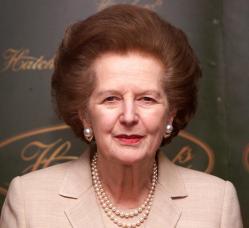A few years ago I had a journalism fellowship at Cambridge University with the John Templeton Foundation, and for part of it we stayed at Churchill College, named for the late prime minister. The college houses a vast collection of Winston Churchill’s papers and is also the repository for the personal and political papers of the now-late Margaret Thatcher. Their website points out, “Thus the Churchill Archives Centre is the British equivalent of not one but two of the great American presidential libraries—a unique distinction.”
We were given a private tour through the archives led by a charming official who gave us a look at the enormous reinforced and temperature-controlled facilities. The speeches, scribbles, correspondence, and memorabilia of these historic prime ministers, one man, one woman, would survive flood, fire, explosion; it was clear the buildings were built to survive the unimaginable possibility of another Blitz.
It was with rather un-British enthusiasm that the archivist talked about the thrill of getting materials directly from Thatcher herself and sorting through this voluminous and growing collection. This link to it describes some of these documents, which show the unflinching, unrelenting intensity that Thatcher brought to the task of being a leader. She saw her country through a war with Argentina over the Falkland Islands, and stood up to the all-powerful trade unions, which had had a chokehold on the British economy. But amid the evidence regarding these huge undertakings was a running theme about what it took not just to wield power, but to wield power as a woman.
For example, after the Falklands War, Thatcher visited the Far East, a politically freighted journey which began the negotiations for the return of Hong Kong to China. The archive describes a marvelous document which sums up Thatcher’s decisiveness and clarity. She received a suggestion that she lay a wreath in Tiananmen Square at the Monument to Revolutionary Martyrs, a Communist party tribute to itself, with the explanation that many Western leaders had done so. The archive notes, “She simply scrawls ‘NO’ in capped letters next to the suggestion.” The papers for this trip also include a list of the carefully selected outfits she was going to wear, meeting by meeting: “all the outfits were given names such as Smoky, Fuchsia and Plum Stars.” At the official banquet in China that the British hosted, the archive reports, “She also became embroiled in a heated dispute about the possibility of serving jam sandwiches for dessert (considered a treat for foreign visitors). Meriting official discussion with the Foreign Office, Thatcher opted for a fruit salad dessert instead.”
At the end of our visit the official brought out a clear, custom-made case as if he were a jeweler purveying a great gemstone. Inside it was one of Thatcher’s favorite purses, clearly well-used and held dear by its owner. He pulled open a drawer from the case that revealed the contents of Thatcher’s bag, including a gold compact and lipstick. A handwritten note from her confirmed the use of all these objects while in office. How marvelous it was to gaze on a purse, powder compact, and lipstick and see them as the trappings of power. How sad that going on a generation after she left office, such accouterments to power are still so rare.
